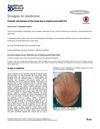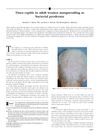 April 2008 in “Expert review of dermatology”
April 2008 in “Expert review of dermatology” Mutations in the P2RY5 gene cause hereditary woolly hair.
 November 1998 in “Journal of The European Academy of Dermatology and Venereology”
November 1998 in “Journal of The European Academy of Dermatology and Venereology” A man's skin cancer improved and some of his hair grew back after treatment with a special light therapy and a medication.
 April 2024 in “Skin research and technology”
April 2024 in “Skin research and technology” Botulinum toxin A has limited effectiveness for 3 months in treating female pattern hair loss and may reduce scalp oiliness.
 January 2020 in “The Journal of Sexual Medicine”
January 2020 in “The Journal of Sexual Medicine” Using 5α-reductase inhibitors for hair loss can cause lasting sexual, physical, mental, and vascular health issues in men, even after stopping the medication.
 February 2019 in “PubMed”
February 2019 in “PubMed” The most common treatment for hair loss in the study was a 5% minoxidil solution, with women more likely to receive multiple medications. A significant number of patients also had hypothyroidism.
 December 2015 in “Faculty Opinions – Post-Publication Peer Review of the Biomedical Literature”
December 2015 in “Faculty Opinions – Post-Publication Peer Review of the Biomedical Literature” Finasteride, a hair loss treatment, may cause long-term sexual dysfunction and depression.
 16 citations,
July 2017 in “Rheumatology and Therapy”
16 citations,
July 2017 in “Rheumatology and Therapy” Tofacitinib, a medication for arthritis, showed potential for treating severe hair loss in a small Brazilian case series, but more research is needed.
 10 citations,
December 2014 in “PubMed”
10 citations,
December 2014 in “PubMed” Finasteride, a hair loss drug, may cause sexual dysfunction and depression, but these effects are usually temporary and the drug is generally safe. More research is needed.
 5 citations,
June 2015 in “International Journal of Women's Dermatology”
5 citations,
June 2015 in “International Journal of Women's Dermatology” Hirsutism, excessive hair growth in women, is often caused by PCOS and can be managed with medication and personalized treatment plans.
5 citations,
November 2013 in “Case reports in dermatology” A woman's skin darkened after using dutasteride and pimecrolimus for hair loss, but improved when she stopped the medications and protected her skin from light.
4 citations,
June 2017 in “Annales de dermatologie et de vénéréologie” The study found that a specific type of hair loss is increasingly common in premenopausal women and can be effectively diagnosed and treated with various medications.
 3 citations,
January 2018
3 citations,
January 2018 A woman had an unusual allergic reaction to a hair loss treatment, which cleared up after stopping the treatment and using a different medication.
June 2002 in “Current obstetrics and gynaecology/Current obstetrics & gynaecology” Hirsutism, excessive hair growth in women, often caused by high androgen levels and polycystic ovary syndrome, can be treated with medication and weight management.
 August 2023 in “JAAD International”
August 2023 in “JAAD International” Low dose oral minoxidil is generally safe and can improve hair loss in women, with some experiencing side effects and minimal blood pressure changes.
 June 2023 in “Clinical and Experimental Dermatology”
June 2023 in “Clinical and Experimental Dermatology” Gender-affirming hormone therapy changes hair growth in transgender people, with feminizing therapy reducing hair and masculinizing therapy increasing it, but sometimes additional treatment is needed.
 February 2010 in “Journal of The American Academy of Dermatology”
February 2010 in “Journal of The American Academy of Dermatology” A woman with Degos disease managed her condition for nine years with medications and had two healthy pregnancies, while a separate finding suggests a possible link between female pattern hair loss and high blood pressure.
 January 2010 in “Elsevier eBooks”
January 2010 in “Elsevier eBooks” The document concludes that different types of hair loss have specific treatments, and early diagnosis is crucial for preventing permanent hair loss.
 January 2017 in “Scripta Scientifica Vox Studentium”
January 2017 in “Scripta Scientifica Vox Studentium” Finasterid 1mg, used for male hair loss, can cause sexual problems in some men, which can last for several months even after stopping the medication.
 16 citations,
January 2007 in “Journal of Obstetrics and Gynaecology”
16 citations,
January 2007 in “Journal of Obstetrics and Gynaecology” The document suggests various treatments for PCOS, including medication for menstrual issues, insulin resistance, and excess hair, as well as fertility treatments, while highlighting the need for personalized care and lifestyle changes.
 5 citations,
June 1998 in “PubMed”
5 citations,
June 1998 in “PubMed” Excessive androgen in women can cause acne, hair growth, baldness, and PCOS, often treatable with medication.
 May 2017 in “Urology and andrology”
May 2017 in “Urology and andrology” Finasteride and dutasteride, used for prostate issues and hair loss, can cause side effects like sexual dysfunction and mental issues, which may continue even after stopping the medication, a condition called post-finasteride syndrome, for which there's currently no cure.
 1 citations,
August 2021 in “Internal Medicine Journal”
1 citations,
August 2021 in “Internal Medicine Journal” After severe COVID-19, 71% of patients experienced excessive hair shedding and thinning within 3 months due to factors like low oxygen levels, medication, stress, and autoimmune disease.
 2 citations,
April 2022 in “Cureus”
2 citations,
April 2022 in “Cureus” A healthy woman got a chest abscess from a fungal infection after gallbladder surgery, which was treated but caused temporary hair loss due to the antifungal medication.
May 2013 in “Optometry and vision science” The document discusses challenges in eye care, including treating melanoma before macular hole repair, bloody tears resolved by blood pressure control, eyelash regrowth in hair-pulling disorder with medication, a non-invasive method to detect eyelash mites, and the psychological factors affecting contact lens comfort.
 September 2017 in “Pediatric Dermatology”
September 2017 in “Pediatric Dermatology” The document concludes that an experimental drug may help wound healing in Epidermolysis Bullosa, links Hydroa vacciniforme to EBV, discusses diagnosing hair loss disorders, finds many children with eczema have allergies, reviews the safety of a skin medication in children, notes side effects of a Duchenne's treatment, and identifies a marker for pediatric mastocytosis.
 October 2016 in “Journal of the Dermatology Nurses’ Association”
October 2016 in “Journal of the Dermatology Nurses’ Association” Polycystic Ovary Syndrome (PCOS) affects 6%-15% of women of reproductive age, causing symptoms like acne and hair loss, and increasing the risk of type 2 diabetes and heart disease; it's managed through diet, exercise, and medications like Metformin and hormonal contraceptives.
 55 citations,
July 2016 in “Dermatologic Therapy”
55 citations,
July 2016 in “Dermatologic Therapy” Multiple treatments work best for hair loss.
42 citations,
March 2015 in “Anais Brasileiros de Dermatologia” Anti-TNF therapy can cause hair loss and skin issues.
 35 citations,
January 1993 in “International Journal of Dermatology”
35 citations,
January 1993 in “International Journal of Dermatology” People with HIV and low T cell counts have more hair and scalp problems.
 32 citations,
August 2003 in “Journal of the American Academy of Dermatology”
32 citations,
August 2003 in “Journal of the American Academy of Dermatology” Tinea capitis can be misdiagnosed as bacterial infection in adult women but is treatable with antifungal medication.

























